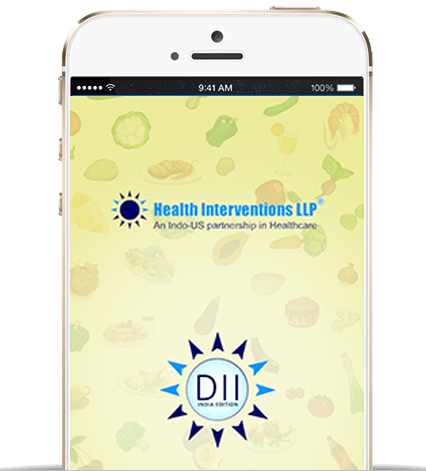Case Studies

Designing and developing a literature-derived, population-based dietary inflammatory indexTM
A literature-derived, population-based dietary inflammatory indexTM (DII®) to compare diverse populations on the inflammatory potential of their diets. The Dietary Inflammatory IndexTM Development Study was conducted in the Cancer Prevention and Control Program of the University of South Carolina in Columbia, SC, USA from 2011 to 2012 (National Institute of Health, United States of America; NIH Public Access Author Manuscript - Public Health Nutr. 2014 August; 17(8): 1689–1696. doi:10.1017/S1368980013002115).

The Dietary Inflammatory IndexTM: A New Tool for Assessing Diet Quality Based on Inflammatory Potential
it is well known chronic inflammation is associated with a variety of chronic diseases and other conditions and diet modulates inflammation. This one, a population-based literature-derived dietary inflammatory indexTM (DII®) to assess the inflammatory of an individual’s overall diet, and compared DII scores across three different simulated diet plans (The Digest,Volume 49,Number 3 – Summer 2014: Academy of Nutrition and Dietics).

Consumption of ready-made meals and increased risk of obesity.
Abstract
The consumption of ready-made meals, such as pre-packaged dishes, available at grocery stores and fast-food restaurants, is a habit related to our modern fast-paced lives. No study has examined the association of daily ready-made meal consumption with diet quality or health-related outcomes. The present study aimed to investigate the association between self-reported ready-made meal consumption and diet quality, as measured by compliance with dietary recommendations and with a set of adiposity measures, in a nationally representative sample of 1352 subjects, aged 18–69 years, participating in the nationwide population-based ORISCAV-LUX (Observation of Cardiovascular Risk Factors in Luxembourg) survey.
PMID:25488071. NIHMS:656833. PMCID:PMC4302389.

Cross-dietary indices comparison against markers of chronic diseases.
Abstract
The scientific community has become increasingly interested in the overall quality of diets rather than in single food-based or single nutrient-based approaches to examine diet-disease relationships. Despite the plethora of indices used to measure diet quality, there still exist questions as to which of these can best predict health outcomes. The present study aimed to compare the ability of five diet quality indices, namely the Recommendation Compliance Index (RCI), Diet Quality Index-International (DQI-I), Dietary Approaches to Stop Hypertension (DASH), Mediterranean Diet Score (MDS), and Dietary Inflammatory Index (DII), to detect changes in chronic disease risk biomarkers.
PMID:25475010. NIHMS:656925..

Dietary inflammatory indexTM and inflammatory gene interactions in relation to colorectal cancer risk in the Bellvitge colorectal cancer case-control study.
Abstract
Chronic inflammation is an important factor in colorectal carcinogenesis. However, evidence on the effect of pro-inflammatory and anti-inflammatory foods and nutrients is scarce. Moreover, there are few studies focusing on diet–gene interactions on inflammation and colorectal cancer (CRC). This study was designed to investigate the association between the novel dietary inflammatory indexTM (DII®) and CRC and its potential interaction with polymorphisms in inflammatory genes. Data from the Bellvitge Colorectal Cancer Study, a case–control study (424 cases with incident colorectal cancer and 401 hospital-based controls), were used. The DII score for each participant was obtained by multiplying intakes of dietary components from a validated dietary history questionnaire by literature-based dietary inflammatory weights that reflected the inflammatory potential of components. Data from four important single nucleotide polymorphisms located in genes thought to be important in inflammation-associated CRC: i.e., interleukin (IL)-4, IL-6, IL-8, and peroxisome proliferator-activated receptor-γ (PPARG) were analyzed.
PMID:25488145. PMCID:PMC PMC4259879.

Can diet in conjunction with stress reduction affect the rate of increase in prostate specific antigen after biochemical recurrence of prostate cancer
Abstract
Epidemiological and laboratory evidence indicates that a Western diet is associated with an increased incidence of prostate cancer. Specific components of the diet, such as high saturated fat, low fiber and high meat content, may have greatest clinical significance in the later stages of tumor promotion and progression. However, departure from the conventional diet is difficult to initiate and maintain. Therefore, we combined the well-known Mindfulness-Based Stress Reduction (MBSR) program with a low saturated fat, high-fiber, plant-based diet to determine the effect on the rate of change in prostate specific antigen (PSA) in patients with biochemical recurrence after prostatectomy.

Plasma carotenoids and tocopherols in relation to prostate-specific antigen (PSA) levels among men with biochemical recurrence of prostate cancer
Although men presenting with clinically localized prostate cancer (PrCA) often are treated with radical prostatectomy or radiation therapy with curative intent, about 25–40% develop biochemically recurrent PrCA within 5 years of treatment, which has no known cure. Studies suggest that carotenoid and tocopherol intake may be associated with PrCA risk and progression. We examined plasma carotenoid and tocopherol levels in relation to prostate-specific antigen (PSA) levels among men with PSA-defined biochemical recurrence of PrCA.

Randomization to plant-based dietary approaches leads to larger short-term improvements in Dietary Inflammatory IndexTM scores and macronutrient intake compared to diets that contain meat.
Abstract
Studies have examined nutrient differences among people following different plant-based diets. However, all of these studies have been observational. The aim of the present study was to examine differences in nutrient intake and Dietary Inflammatory IndexTM (DII®) scores among overweight and obese (body mass index 25.0-49.9 kg/m(2)) adults randomized to receive dietary instruction on a vegan (n = 12), vegetarian (n = 13), pescovegetarian (n = 13), semivegetarian (n = 13), or omnivorous (n = 12) diet during a 6-month randomized controlled trial. Nutrient intake, nutrient adequacy, and DII score were assessed via two 24-hour dietary recalls (Automated Self-Administered 24-Hour Dietary Recall) at baseline and at 2 and 6 months. Differences in nutrient intake and the DII were examined using general linear models with follow-up tests at each time point. We hypothesized that individuals randomized to the vegan diet would have lower DII scores and greater improvements in fiber, carbohydrate, fat, saturated fat, and cholesterol at both 2 and 6 months as compared with the other 4 diets.
PMID:25532675

Dietary inflammatory index and anthropometric measures of obesity in a population sample at high cardiovascular risk from the PREDIMED trial.
Abstract
The dietary inflammatory indexTM (DII®) is a new tool to assess the inflammatory potential of the diet. In the present study, we aimed to determine the association between the DII and BMI, waist circumference and waist:height ratio (WHtR). We conducted a cross-sectional study of 7236 participants recruited into the PREvención con DIeta MEDiterránea trial. Information from a validated 137-item FFQ was used to calculate energy, food and nutrient intakes. A fourteen-item dietary screener was used to assess adherence to the Mediterranean diet (MeDiet). Sex-specific multivariable linear regression models were fitted to estimate differences (and 95 % CI) in BMI, waist circumference and WHtR across the quintiles of the DII. All nutrient intakes, healthy foods and adherence to the MeDiet were higher in the quintile with the lowest DII score (more anti-inflammatory values) except for intakes of animal protein, saturated fat and monounsaturated fat. Although an inverse association between the DII and total energy was apparent, the DII was associated with higher average BMI, waist circumference and WHtR after adjusting for known risk factors.
PMID: 25720588 PMCID: PMC4870040 DOI: 10.1017/S0007114514004401

The Association between Dietary Inflammatory IndexTM and risk of colorectal cancer among postmenopausal women: Results from the Women’s Health Initiative.
Abstract
Inflammation is a process central to carcinogenesis and in particular to colorectal cancer (CRC). Previously, we developed a dietary inflammatory indexTM (DII®) from extensive literature review to assess the inflammatory potential of diet. In the current study, we utilized this novel index in the Women's Health Initiative to prospectively evaluate its association with risk of CRC in postmenopausal women. The DII was calculated from baseline food frequency questionnaires administered to 152,536 women aged 50-79 years without CRC at baseline between 1993 and 1998 and followed through 30 September 2010. Incident CRC cases were ascertained through a central physician adjudication process. Multiple covariate-adjusted Cox proportional hazards regression models were used to estimate hazard ratios (HR) and 95 % confidence intervals (95 % CI) for colorectal, colon (proximal/distal locations), and rectal cancer risk, by DII quintiles (Q).
PMID:25549833

Pro-inflammatory dietary intake as a risk factor for cardiovascular disease in men: a 5-year longitudinal study.
Abstract
Convincing evidence has identified inflammation as an initiator of atherosclerosis, underpinning CVD. We investigated (i) whether dietary inflammation, as measured by the 'dietary inflammatory indexTM (DII®)', was predictive of 5-year CVD in men and (ii) its predictive ability compared with that of SFA intake alone. The sample consisted of 1363 men enrolled in the Geelong Osteoporosis Study who completed an FFQ at baseline (2001-2006) (excluding participants who were identified as having previous CVD). DII scores were computed from participants' reported intakes of carbohydrate, micronutrients and glycaemic load. DII scores were dichotomised into a pro-inflammatory diet (positive values) or an anti-inflammatory diet (negative values).
PMID:26450630

Association between diet-related inflammation, all-cause, all cancer, and cardiovascular disease mortality, with special focus on prediabetics
Abstract
Chronic inflammation is associated with increased risk of cancer, cardiovascular disease (CVD), and diabetes. The role of pro-inflammatory diet in the risk of cancer mortality and CVD mortality in prediabetics is unclear. We examined the relationship between diet-associated inflammation, as measured by dietary inflammatory index TM(DII®) score, and mortality, with special focus on prediabetics. This prospective cohort study used data from the Third National Health and Nutrition Examination Survey (NHANES III). We categorized 13,280 eligible participants, ages 20-90 years, according to glycosylated hemoglobin (HgbA1c) level and identified 2681 with prediabetes, defined as a glycosylated hemoglobin percentage of 5.7-6.4. Computation of DII scores and all statistical analyses were conducted in 2015.
PMID:26825592

Pancreatic cancer : Associations of inflammatory potential of diet, cigarette smoking, and long-standing diabetes.
Abstract
Epidemiologic studies show strong associations between pancreatic cancer (PC) and inflammatory stimuli or conditions such as cigarette smoking and diabetes, suggesting that inflammation may play a key role in PC. Studies of dietary patterns and cancer outcomes also suggest that diet might influence an individual's risk of PC by modulating inflammation. We therefore examined independent and joint associations between inflammatory potential of diet, cigarette smoking and long-standing (≥5 years) type II diabetes in relation to risk of PC. Analyses included data from 817 cases and 1756 controls. Inflammatory potential of diet was measured using the dietary inflammatory indexTM (DII®), calculated from dietary intake assessed via a 144-item food frequency questionnaire, and adjusted for energy intake.
PMID:26905587



